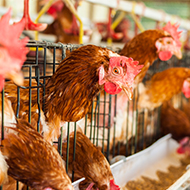BSE case confirmed in Scotland
“The fast detection of this case is proof that our surveillance system is doing its job” – Sheila Voas.
A single case of classical bovine spongiform encephalopathy (BSE) has been confirmed in Scotland.
The disease was detected on a farm in Ayrshire as part of routine surveillance after the animal died. The case has been described by Scotland’s chief veterinary officer as an “isolated” one.
Farmers are being urged to seek veterinary advice if they have any concerns.
As required by UK law, the cohorts and offspring of the infected cow will be humanely culled and the carcasses destroyed.
Movement restrictions have been put in place as a precaution at both the premises where the case was discovered and three other sites - the farm where the animal originated and two farms where cattle have had access to the same feed.
The Animal Plant and Health Agency (APHA) is investigating the origins of the outbreak. The animal, which was kept for breeding, did not enter the human food chain and Food Standards Scotland have said there is no risk to human health.
The case is the first case of classical BSE in the UK since September 2021 and only the fifth since 2014.
Scotland’s chief veterinary officer Sheila Voas said: “The fast detection of this case is proof that our surveillance system is doing its job. We are working closely with the APHA and other partners to identify where the disease came from.
“I want to reassure both farmers and the public that the risk associated with this isolated case is minimal.”
Anna Judson, British Veterinary Association president, said: “While this is clearly concerning for everyone involved in the farming industry and the veterinary profession, it shows that the comprehensive and robust veterinary surveillance system is effective in detecting potential risk, enabling the authorities to put in place appropriate precautionary measures.”
Image © Shutterstock



 An Avian Influenza Prevention Zone (AIPZ) has been introduced across Wales.
An Avian Influenza Prevention Zone (AIPZ) has been introduced across Wales.